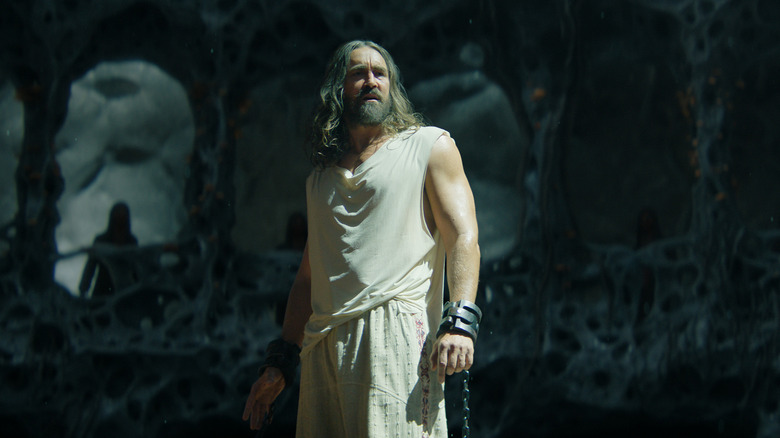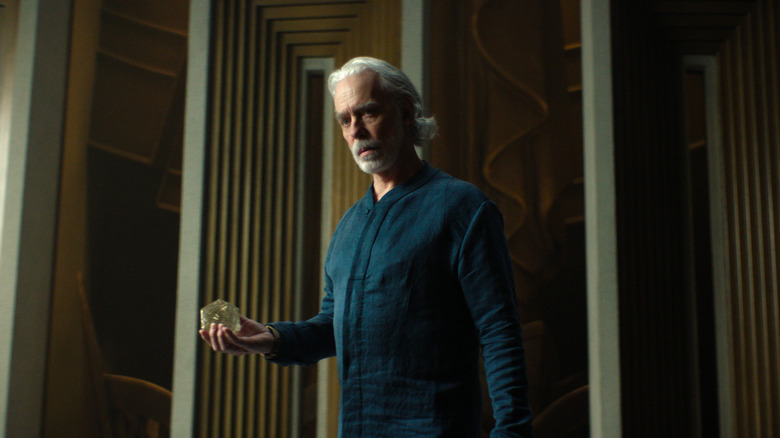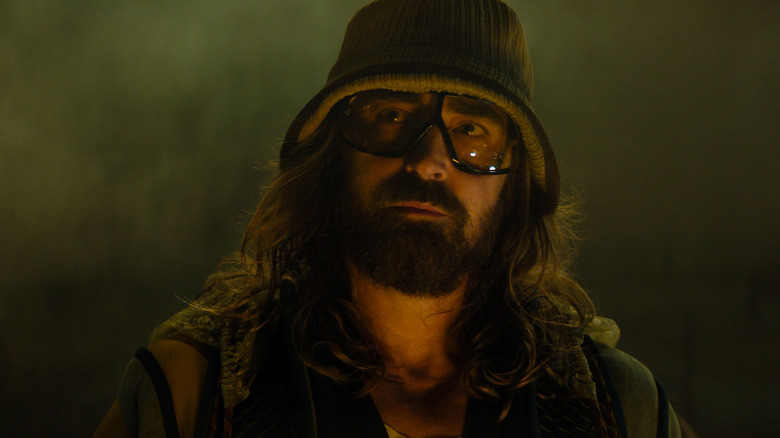Foundation Fans May Have Missed The Answer To The Cleons' Biggest Change In Season 3
Spoilers ahead for season 3 of "Foundation" up to episode 8.
The TV adaptation of Isaac Asimov's "Foundation" has been a rather fascinating exercise in adapting a gargantuan work of science fiction. Much like Denis Villeneuve did with "Dune," David S. Goyer and Josh Friedman took a dense, complex, story where a lot of information is told rather than shown, and turned it into a blockbuster-sized epic with enough action and romance to give the story mass appeal. "Foundation" season 3 even introduces a Death Star just for the sake of having a big planet-killing space station, and every season so far has had at least one big-scale space battle with tons of VFX, space dogfighting, and more — as well as a healthy dose of Lee Pace being half naked (or completely naked) each season.
And yet, the show is still very much a dense work of science fiction about a Galactic Empire on the verge of collapse and a group of mathematicians and historians trying to prevent the fall of civilization. This season, "Foundation" even grew the timespan of the story exponentially by bringing in the Robo Wars and Asimov's "Robot" series, making the story we're seeing but the latest chapter in a saga that started thousands of years prior on a planet all but forgotten. Though the show makes plenty of changes that — at times — make it nearly unrecognizable from the source material, most of these changes end up being for the benefit of the story as it's translated to the medium of television.
Take the Genetic Dynasty, a concept entirely original to the TV show, and one of the best parts of "Foundation." In the books, we meet Cleon II, the last great Emperor of the Galactic Empire, whose line ends rather quickly after him and whose name has little consequence for the rest of the story. In "Foundation," we meet three emperors Cleons, all clones of the original Cleon I at different ages: Brother Dawn as a prepubescent Emperor; Brother Day as a middle-aged clone who does most of the ruling; and Brother Dusk as an elderly Cleon who advises Day and mentors Dawn. The idea was to prevent succession problems and establish a personification of the permanence of Empire's power, reach, and rule. The Cleons don't change, don't die, don't end.
But we are seeing all of that come crashing down in season 3, and the seeds of that were planted all the way in season 1, when we discovered a heist like no other took place on the imperial capital of Trantor and forever changed the fate of the Galactic Empire.
A genetic heist
The three Cleons are trained from birth to act exactly like their brothers/selves: to be the same person without any single hint of deviation. They are three, but they are one Cleon. But back in season 1 we learned that young Brother Dawn (Cleon 14) was born with color blindness, an impossibility among the Cleons. If that wasn't enough, Dawn and Day were considerably more emotional, less cruel and less cold than their predecessors. We learned at the end of he season that anti-Imperial rebels managed to get to Dawn before he was decanted and tampered with his DNA, causing the color blindness. Except that wasn't the full extent of the genetic heist, because the rebels also managed to tamper with the original source material — the DNA sample belonging to Cleon I.
Though no one knew at the time what that meant, it was clear that the Genetic Dynasty would slowly and irrevocably diverge from the original Cleon. Since then, we have seen each Cleon act a little different each time, whether it's in their aggression, their curiosity, their kindness, or their capacity for love. It was easy, however, to blame this in part to the rapidly changing landscape of the galaxy. In between Cleon 14 and our current Brother Day (Cleon XXIV), the Empire has greatly condensed and lost power, while the Foundation conquers more and more worlds and becomes a proper threat to the Cleons' dominion. It is not beyond reason to think this has altered the behavior and mindset of the Cleons who have grown up with considerably less power and many more problems to deal with.
And so we come to season 3, where the differences between the Cleons are not just noticeable, they are undeniable. In this era, Brother Dawn is outright working for the Foundation, while Brother Day (Cleon XXIV) is living his "Big Lebowski" years by growing his hair and beard, spending his time gambling with his guards, getting high, and cloning random extinct species for his garden home. Oh, and he is also so in love with one of his concubines he decides to escape the palace and risk his life for her.
If that wasn't enough, there are apparently signs of deterioration in every Brother Dusk that are appearing faster and faster, leading to a younger phasing out (Dusk being euthanized and replaced by Day) with every generation.
A story that only time can afford to tell
A big part of why this Cleon storyline is so satisfying to see — and why every scene with what fans are calling "Brother Dude" is delightful and fun — is that "Foundation" has been telling its story over several centuries. Although most of the cast is replaced with new characters every season (as happens in the books), the TV show does retain some cast members, most notably the robot Demerzel (Laura Birn) and the three Cleons. This allows "Foundation" to explore how an empire slowly crumbles over a long period of time by showing the decay of its personification.
There is a flashback scene in episode 7 where Cleon XXIV recalls a lesson in etiquette with his brothers when he was a young Dawn, and how he was unable to follow up with the graceful and precisely-timed movements of the other Cleons. The scene is about Cleon growing up feeling like a disappointment: a lesser Cleon compared to those who came before. That is a common theme in stories about royals or people in positions of power that come with heavy baggage and legacy. And yet, it is precisely the fact that here it is a single individual who has had that position of power for centuries, and whose latest clones have strayed far away from the original, that makes "Foundation" such a unique sci-fi show. Cleon is not just a disappointment as an heir; he is literally faulty. He is living proof of the slow, ongoing fall of the Galactic Empire.
This has created an existential crisis for Brother Dude that led to his abandoning his duties, and is also giving Brother Dusk anxiety like no other Cleon has felt because he's been killed younger than any before him, at a critical time for the history of the Empire. We don't know how many more Cleons we'll get after this batch, but whether The Mule wipes them out or not, "Foundation" has told one of the best sci-fi stories ever on TV through these clone-brothers.


